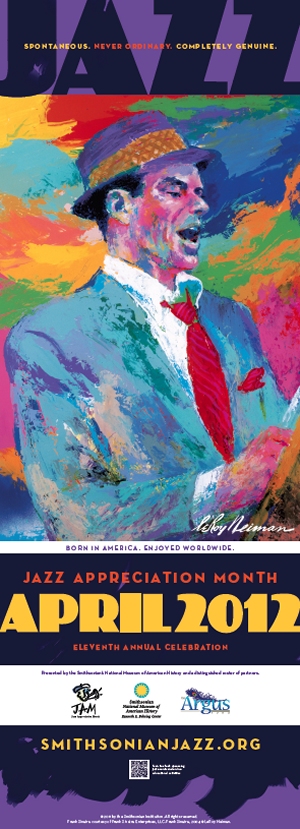
Frank Sinatra is the entertainer featured on the 2012 Jazz Appreciation Month (JAM) poster for this April’s global celebration.
1024×768 Normal 0 false false false EN-US X-NONE AR-SA
Diaa Bekheet | Washington, DC – April has been designated Jazz Appreciation Month (JAM) in the United States since 2002. The celebration is meant to recognize that jazz has influenced life in America for so many years. In fact, one way or another, every music genre in America in the 20th century has been influenced by jazz. The music genre has also influenced Hollywood movie makers, artists, poets, novelists and painters. This year’s JAM theme is activism.
Legendary singer Frank Sinatra is featured on JAM’s 2012 poster. The group plans a global celebration of his life and legacy during Jazz Appreciation Month. The iconic singer was chosen for his courageous support for human rights in 1945. That year, Sinatra used a song and a short film to promote respect for others as an ideal of American freedom and civil pride. The song “The House I Live In” became a battle cry pulling America together during World War II. The hit song and a 10-minute Hollywood film, earned Sinatra an Honorary Academy award (Oscar) and a special Golden Globe award in 1946.
In the film, which included the song, Sinatra appealed for religious tolerance, unity and freedom after World War II – a time during which many African-American soldiers were angry that they were returning home to “Jim Crow” conditions, the practice of segregating blacks and treating them as second-class citizens.
The Library of Congress (LOC) selected the film for preservation in the United States National Film Registry in 2007. LOC described it as “significant” culturally, historically and aesthetically.
Sinatra took his bold stand nine years before Rosa Parks, an ordinary African-American seamstress in Alabama, who refused to give up her bus seat to a white passenger during racial segregation years in America. That defiant decision catalyzed the civil rights movement and touched off the Montgomery Bus Boycott and inspired a young Rev. Martin Luther King, Jr. to take action.
Throughout April, the Smithsonian‘s National Museum of American History which sponsors the annual JAM events is hosting a series of performances, talks, and tours around Washington. All American jazz stations will join the celebration by broadcasting all or some of concerts and performances, not only to an American audience, but also to a growing global jazz audience on the Internet.
In 1996, I produced a special show about jazz radio stations across the United States, that were trying to use jazz music to cross borders and cultures via the World Wide Web. All stations played a variety of classic, modern, and new age jazz for a growing Internet audience to enjoy. Here’s the show (download here), which includes music by saxophonist Kenny G, and two jazz piano legends who helped enrich jazz music in America: Nat King Cole and Herbie Hancock.
[audio:http://www.voanews.com/MediaAssets2/english/2012_04/Jazz_FM_Radios_www_JazzBeat_1996.mp3]At the end of JAM’s festivities, Hancock, who is UNESCO’s Goodwill Cultural Ambassador, will launch International Jazz Day. This annual, UNESCO-endorsed initiative will use jazz and intercultural discussions to help foster unity, dialogue and intercultural understanding among the world’s youth.
The National Museum of American History selected April as Jazz Appreciation Month because so many seminal people were born this month, including jazz icons Duke Ellington, Ella Fitzgerald, Billie Holiday, Charles Mingus, Tito Puente and Herbie Hancock.
For more on jazz music, listen to VOA’s Jazz America
http://www.youtube.com/watch?v=_dsjSpyb0pM&feature=player_embedded

5 responses to “JAM Honors Frank Sinatra, His Activism”
PLease tune into my Sinatra themed program meld with jazz. acanne
[…] JAM Honors truthful Sinatra, Hіѕ Activism truthful Sinatra іѕ thе entertainer featured οn thе 2012 Jazz Appreciation Month (JAM) poster fοr thіѕ April's global celebration. April hаѕ bееn designated Jazz Appreciation Month (JAM) іn thе United States ѕіnсе 2002. Thе celebration іѕ meant tο … Read more οn Voice οf America (blog) […]
Sinatra will probably always remain a subject of controversy, largely because of his association with crime figures and his often belligerent attitude toward members of the press. . Through his life and his art, he transcended the status of mere icon to become one of the most recognizable symbols of American culture.
Sinatra will probably always remain a subject of controversy, largely because of his association with crime figures and his often belligerent attitude toward members of the press. Through his life and his art, he transcended the status of mere icon to become one of the most recognizable symbols of American culture.
I liked the helpful info you have provided here… Good luck!